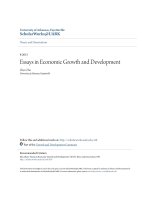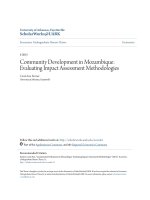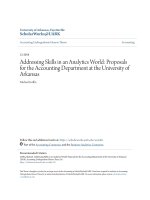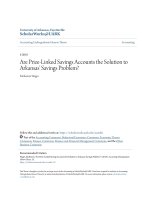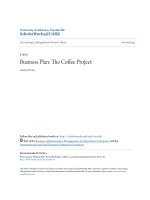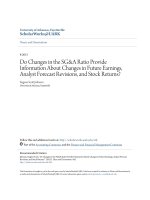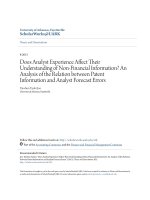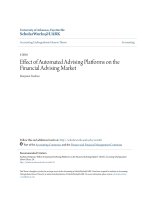Accounting undergraduate Honors theses: Lobbying activity in the standards setting process - Fasb statement on financial accounting standards no. 106, employers accounting for
Bạn đang xem bản rút gọn của tài liệu. Xem và tải ngay bản đầy đủ của tài liệu tại đây (3.91 MB, 132 trang )
University of Arkansas, Fayetteville
ScholarWorks@UARK
Theses and Dissertations
12-1992
Lobbying Activity in the Standards Setting Process:
FASB Statement on Financial Accounting
Standards No. 106, "Employers' Accounting for
Postretirement Benefits Other than Pensions"
Christine Schalow
University of Arkansas, Fayetteville
Follow this and additional works at: />Part of the Accounting Commons, Corporate Finance Commons, and the Finance and Financial
Management Commons
Recommended Citation
Schalow, Christine, "Lobbying Activity in the Standards Setting Process: FASB Statement on Financial Accounting Standards No. 106,
"Employers' Accounting for Postretirement Benefits Other than Pensions"" (1992). Theses and Dissertations. 3014.
/>
This Dissertation is brought to you for free and open access by ScholarWorks@UARK. It has been accepted for inclusion in Theses and Dissertations by
an authorized administrator of ScholarWorks@UARK. For more information, please contact ,
LOBBYING ACTIVITY IN THE STANDARDS SETTING PROCESS:
FASB STATEMENT ON FINANCIAL ACCOUNTING STANDARDS NO. 106,
"EMPLOYERS' ACCOUNTING FOR POSTRETIREMENT BENEFITS
OTHER THAN PENSIONS"
R eproduced w ith perm ission o f the co p yrig h t ow ner. F urthe r rep rod uction prohibited w ith o u t perm ission.
LOBBYING ACTIVITY IN THE STANDARDS SETTING PROCESS:
FASB STATEMENT ON FINANCIAL ACCOUNTING STANDARDS NO. 106,
"EMPLOYERS' ACCOUNTING FOR POSTRETIREMENT BENEFITS
OTHER THAN PENSIONS"
A dissertation submitted in partial fulfillment
of tbe requirements for the degree of
Doctor of Philosophy
By
Christine Marie Schalow, B.S., M.S.
University of Wisconsin at Green Bay, 1985
St. Cloud state University, 1987
December, 1992
university of Arkansas
R e pro duce d w ith perm issio n o f the co p yrig h t ow ner. F urthe r rep rod uction prohibited w ith o u t perm ission.
TABLE OF CONTENTS
Chapter 1: Overview of the Study
Introduction.............................. 1
Purpose of the Study....................... 2
The Accounting Standards Setting Process......4
Employers' Accounting for Postretirement
Benefits Other Than Pensions........... 10
Contributions of the Study................. 14
Organization of the Study.................. 16
Chapter 2: Review of the Literature
Introduction..............................17
Background............................... 18
Position Choice Research................... 18
Lobbying Participation Choice Research.......21
Summary.................................. 26
Chapter 3: Research Methodology
Introduction.............................. 28
Development of the Position Choice
Hypotheses........................... 29
Development of the Lobbying Participation
Choice Hypotheses..................... 34
Population, Target Population, and
Sample of Firms.......................36
Development of the Research
Instrument........................... 39
Survey...............................40
Statistical Methodology.................... 41
Dependent Variables................... 41
iii
R eproduced w ith perm ission o f the cop yrig ht ow ner. F urthe r rep rod uction prohibited w ith o u t perm ission.
Independent Variables................. 42
Descriptive Statistics and Univariate
Statistical Tests................ 44
Logistic Regression Analysis........... 45
Assumptions of the
Logistic Regression Model......... 47
Interpretation of
Logistic Regression Results....... 49
Summary.................................. 51
Chapter 4:
Results of the Study
Introduction..............................52
Results of the Survey......................52
Tests for Survey Nonresponse Bias...... 52
Other Survey Results.................. 57
Summary Statistics.................... 59
Descriptive Statistics and Univariate Tests...62
Assessment of Model Assumptions............. 62
Results of the Logistic Regression
Procedure............................ 65
The Position Choice Model:
Industrial Companies.................. 67
Firm Size Hypothesis.................. 67
Impact on Financial Statement
Hypothesis.......................69
Leverage Position Hypothesis........... 70
The Position Choice Model:
Utility Companies..................... 71
Summary: The Position Choice Model.......... 73
The Lobbying Participation Choice Model:
Industrial Companies.................. 74
iv
R epro duce d w ith perm ission o f the cop yrig ht ow ner. F urthe r rep rod uction prohibited w ith o u t perm ission.
Firm Size Hypothesis.................. 74
Impact on Financial Statement
Hypothesis.......................76
Leverage Position Hypothesis........... 77
The Lobbying Participation Choice Model:
Utility Companies..................... 77
Summary: The Lobbying Participation
Choice Model......................... 79
Synopsis................................. 80
Chapter 5:
Summary, Conclusions, and
Recommendations
Introduction.........
82
Summary of the Study.......................82
Conclusions of the Study................... 85
Conclusions of the Position
Choice Hypotheses................ 86
Conclusions of the Lobbying
ParticipationChoice Hypotheses
88
Synopsis............................. 89
Limitations of the Study................... 90
Recommendations for Future Research......... 91
Bibliography.............................. 93
Appendix A ............................... .99
Appendix B ............................... 107
Appendix C............................... 115
Appendix D ............................... 119
v
R eproduced w ith perm ission o f the co p yrig h t ow ner. F urthe r rep rod uction prohibited w ith o u t perm ission.
CHAPTER 1
OVERVIEW OF THE STUDY
INTRODUCTION
Arthur R. Wyatt, a former member of the Financial
Accounting Standards Board (FASB), stated (1977) that the
FASB should be more aware of the economic consequences of
proposed accounting standards so it can be prepared to meet
opposition.
Economic consequences arise from contracting
and monitoring costs associated with contractual agreements
(e.g., lending agreements) and political costs (e.g.,
taxation, regulation, and antitrust legislation) (Watts and
Zimmerman, 1986).
The FASB must anticipate concerns of its
constituents about the economic consequences of accounting
changes if it expects to build support for these changes
(Saemann, 1987).
Recently, the FASB has been further criticized by
various sources concerning the standards and the standards
setting process (Chaney and Jeter, 1989; and Ihlanfeldt,
1991).
There has been dissension over the economic
consequences of several recent FASB exposure drafts and
related standards.
The FASB received many objections over
the absence of practical considerations in FASB Statement
No. 87, "Employers' Accounting for Pensions" (Wyatt, 1990).
A related topic, "Employers' Accounting for Postretirement
Benefits Other Than Pensions," (OPEB) Statement No. 106
1
R eproduced w ith perm ission o f the cop yrig ht ow ner. F urthe r rep rod uction prohibited w ith o u t perm ission.
released in December of 1990, received much criticism during
the comment period of the related exposure draft (FASB,
1990).
PURPOSE OF THE STUDY
The purpose of this study is to explain and classify
the behavior of corporate managers1 in the accounting
standards setting process as it related to OPEB in order to
provide insight for developing a more effective process.
This study examined two decisions made by management: (1)
the decision whether or not to participate in lobbying
activities during the comment period of the OPEB exposure
draft; and (2) the position taken on the OPEB exposure
draft.
This study compared the results of surveys of two
groups of corporate representatives— those who filed
written comments with the FASB on its exposure draft,
"Employers' Accounting for Postretirement Benefits Other
Than Pensions," and a sample of corporate representatives
who did not file comments on that exposure draft.
The
sample of nonfilers was selected from corporations that
provide postretirement benefits other than pensions and are
in industry categories similar to corporations whose
representatives filed comment letters with the FASB.
The
1 In this study corporate managers are assumed to
express the position of their employers in regard to
proposed financial reporting standards.
2
R e produced w ith perm ission o f the cop yrig ht ow ner. F urthe r rep rod uction prohibited w ith o u t perm ission.
results of the surveys were analyzed in an attempt to
determine the reasons why the filers decided to lobby and
the nonfilers decided not to lobby.
The survey of nonfilers
requested information as to the corporate position on the
OPEB exposure draft; the position of filers was determined
from their comment letters.
Differences in the position taken and differences in
the decision to lobby between these two groups were then
analyzed.
Knowledge about the characteristics of
lobbyists2 in comparison with characteristics of
nonlobbyists is intended to provide the FASB with
information useful for increasing the participation in the
accounting standards setting process.
Corporate
characteristics (such as firm size, leverage position,
accounting method used for OPEB costs, and maturity of
workforce) of firms whose representatives submitted comment
letters to the FASB on OPEB were compared to the same
corporate characteristics of firms whose representatives did
not submit such letters.
The remainder of this chapter describes the accounting
standards setting process, presents an overview of the OPEB
issue, and identifies the contributions of this study.
2 The terms "lobbyists" and "filers" are used
interchangeably throughout this paper.
3
R epro duce d w ith perm ission o f the co p yrig h t ow ner. F urthe r rep rod uction pro hibited w ith o u t perm ission.
THE ACCOUNTING STANDARDS SETTING PROCESS
The Financial Accounting Standards Board is the
standards setting agency for business and nongovernmental
not-for-profit organizations.
Although the FASB is not a
government agency, much of its authority depends on the
support of governmental bodies, such as the Securities and
Exchange Commission.
Private sector support for the FASB's
accounting standards has come from the American Institute of
Certified Public Accountants (AICPA). The AICPA's Code of
Professional Ethics Rule 203 prohibits an auditor from
stating that a client's financial statements are prepared in
accordance with generally accepted accounting principles
(GAAP) when they do not comply with FASB pronouncements in
all material respects,
since the FASB must rely on
voluntary compliance rather than legislated compliance, it
must operate in an environment characterized by an open due
process system.
The FASB established formal communication channels as
part of its due process procedures to allow constituents to
participate in the standards setting process.
Kelly-Newton
(1980) stated that while the due process procedures allow
for considerable input to the policy maker of the reactions
of its constituents, it is important that these opinions are
seen as substantively impacting the final standards in order
to increase public acceptance of the FASB.
4
R e produced w ith perm ission o f the cop yrig ht ow ner. F urthe r rep rod uction prohibited w ith o u t perm ission.
The open due process system includes lobbying in the
form of comment letters and documents submitted to the FASB
and oral presentations at public hearings held by the FASB.
Respondents to the FASB's exposure drafts may be classified
as investors and creditors, management, auditors,
regulators, and the academic community (Mezias and Chung,
1989).
This study investigates the participation of
management in response to the OPEB exposure draft because
corporate management is the largest class of financial
statement preparers and users (Ihlanfeldt, 1991).
Corporate
management consistently submits the largest proportion of
the comments the FASB receives on its proposals (Mezias and
Chung, 1989; and Tandy and Wilburn, 1992).
The FASB's due process system begins when an issue is
considered for placement on the Board's agenda.
A task
force is often appointed to work with the Board with the
objective of providing input and direction for a project.
The task force also assists in the preparation of a
discussion memorandum (DM). Discussion memoranda are
distributed to subscribers and made available to others.
Written comments are solicited on each DM, and public
hearings may also be scheduled.
After evaluation of all
written and oral comments, the FASB continues its
deliberations on the subject of the DM.
Issuance of an
exposure draft of a proposed statement of financial
accounting standards follows these deliberations if a
5
R eproduced w ith perm ission o f the cop yrig ht ow ner. F urthe r rep rod uction prohibited w ith o u t perm ission.
majority of the seven Board members agree on the wording of
the exposure draft.3 Constituents are invited to respond
to the exposure draft with written comments and by
presenting oral comments during public hearings.
In establishing financial accounting standards, two
basic premises of the FASB are that: (1) it should be
responsive to the needs and viewpoints of the entire
economic community, not just the public accounting
profession, and (2) it should operate in full view of the
public through a "due process" system that gives interested
persons an opportunity to make their views known (Johnson
and Solomons, 1984).
Accounting standards are as much a
product of political action as of careful logic or empirical
findings (Horngren, 1973).
Lobbying is an attempt to
influence the standards setting body, in this case, the
FASB.
The decision to lobby is analogous to the decision to
vote.
Two main sources of uncertainty in the voting
decision are the uncertainty about the benefits of voting
and the uncertainty of the effect of a vote on the outcome
of the election (Downs, 1957).
Lobbyists face similar
uncertainties in reaching the decision to lobby (Sutton,
1984).
As of the date of issuance of the OPEB exposure draft,
February, 1989, a simple majority vote (4 of 7) was all that
was required to approve an exposure draft. However, since
that time a super majority (5 of 7) is required to approve any
issuance.
6
R e pro duce d w ith perm issio n o f th e cop yrig ht ow ner. F urthe r re p rod uction prohibited w ith o u t perm ission.
The most effective way to influence the standards that
dictate accounting practice is to participate in the
formulation of these standards, according to Dennis
Beresford (1990), who has been Chairman of the FASB since
1987.
Therefore, the FASB has become the target of many
pressures and efforts to influence change in the development
of new standards.
Considering the expected economic
consequences of some proposed accounting standards, it is
not surprising that interest groups become vocal and
critical when new standards are being formulated.
Due process procedures of the FASB have definite
political process characteristics and have been shown to be
influenced by the lobbying activities of interested
constituents (Hezias and Chung, 1989).
Operation of a
system of due process depends on the manner of involvement
of the participants.
This study provides information about
how the corporate participants and non-participants perceive
the system and their role in it by analyzing corporate
characteristics.
Knowledge about whether corporate
representatives (i.e., managers) choose to participate in
the standards setting process is important to understand the
standards setting mechanism (Gavens, et al., 1989).
Information about participation is useful to the FASB in
assessing the effectiveness of its due process procedures.
Additional knowledge provided by the present study of why
corporate representatives do or do not participate in the
7
R epro duce d w ith perm issio n o f th e co p yrig h t ow ner. F urthe r rep rod uction prohibited w ith o u t perm ission.
standards setting process allows the FASB greater insight
useful for motivating broader participation and enhancing
communication between the standards setting body and
corporate managers.
Accounting standards affect resource allocation of
corporations; hence, a mechanism is needed to enable
standards setters to form expectations or predictions of the
effect of proposed standards (Kelly, 1982).
Managements'
lobbying activities provide a basis for the FASB to predict
the economic consequences of a proposed accounting standard.
Lobbying efforts from its constituency can assist the FASB
by helping to prevent standards that are unworkable in
application or too costly (Tandy and Wilburn, 1992).
Knowledge about lobbying positions can assist the FASB in
assessing potential opposition to a standard, as well as
assessing subsequent attempts to circumvent reporting
requirements, to subvert the standard, and possibly, to
discredit the policymaker (Kelly, 1985).
Wyatt (1990) stressed that neutrality is a crucial
characteristic of the FASB, in order to maintain the
perception that it is not an agent of any special interest
group.
Lobbying efforts and pressures by certain groups to
have their views adopted is a vital part of the due process.
The Board's modification of its position in reaction to such
efforts does not necessarily support the conclusion that the
Board is primarily political in nature.
For its long run
8
R eproduced w ith perm ission o f the cop yrig ht ow ner. F urthe r rep rod uction prohibited w ith o u t perm ission.
survival the Board must continually reinforce its
credibility.
A policy of neutrality effectively applied
helps the Board avoid becoming anyone's agent for social
change.
When some parties do not participate, the risk of
the process becoming less neutral and more political
increases by unduly reflecting the views of one or a few
special interests (Wyatt, 1990).
The objective of this study is to provide information
as to why a standard is favored or opposed.
Some lobbyists
describe the actions that they plan to take if the standard
is passed (King and O'Keefe, 1986).
The FASB can judge the
importance of the proposed standard to affected firms by the
number of lobbying comments, the position taken, and the
intensity of the positions taken by the lobbyists.
The FASB conducts its activities under a precept that
calls for "promulgating standards only when the expected
benefits exceed the perceived costs," (FASB, 1992, p.l).
The cost of compliance incurred by preparers should be less
than the benefit to users having information they need to
make prudent decisions.
During the comment period for the
OPEB exposure draft, the Financial Executives Research
Foundation sponsored a field test conducted by Coopers &
Lybrand.
Coopers & Lybrand experimented with the proposed
standards in an attempt to estimate the costs and
feasibility of the exposure draft (FERF, 1989).
Information
about lobbying activities in the OPEB standards setting
9
R eproduced w ith perm ission o f the cop yrig ht ow ner. F urthe r rep rod uction prohibited w ith o u t perm ission.
process also assists the FASB in evaluating the cost/benefit
issue.
EMPLOYERS' ACCOUNTING FOR POSTRETIREMENT BENEFITS
OTHER THAN PENSIONS
The FASB issued Statement No. 106, "Employers'
Accounting for Postretirement Benefits Other Than Pensions,"
in December, 1990, which requires accrual accounting for the
costs of postretirement benefits other than pensions.1 The
Statement was the culmination of discussions that began in
1979 when the FASB added other postretirement benefits to
its project on employers' accounting for pensions.
An exposure draft of a proposed statement was issued in
1979, "Disclosure of Pension and Other Postretirement
Benefit Information" (FASB, 1979).
Disclosure of the
description of other postretirement benefits offered,
accounting method used for these costs, and amount of these
costs for the current period were proposed.
Controversy and
confusion over the exposure draft led the FASB to drop other
postretirement disclosures from the final Statement No. 36
(FASB, 1980) issued in 1980 (Schwartz and Lorentz, 1986).
The FASB issued a discussion memorandum in 1981 which
examined accounting for pensions and other postemployment
1 "This Statement is effective for fiscal years beginning
after December 15, 1992, except that the application of this
Statement to plans outside the United States and certain
small, nonpublic employers is delayed to fiscal years
beginning after December 15, 1994. The amendment of Opinion
12 is effective for fiscal years beginning after March 15,
1991." (FASB, 1990, p. 35.)
10
R eproduced w ith perm ission o f the cop yrig ht ow ner. F urthe r rep rod uction prohibited w ith o u t perm ission.
benefits (FASB, 1981).
Types of benefits included in "other
postemployment benefits" were identified as healthcare,
tuition assistance, and legal services.
Postemployment is
defined as the period of time after termination (which
includes the period before retirement) during which
disability and other benefits may be provided, whereas
postretirement is defined as the period after retirement.
Postretirement healthcare and life insurance were reported
by the FASB to be more significant than other benefits
(FASB, 1981).
In 1982, the FASB issued a preliminary views document
which proposed that postretirement healthcare and life
insurance benefits be accrued over the period that the
employee rendered service (FASB, 1982).
Further study of
the issue by the FASB and the publication of another
discussion memorandum in 1983 followed (FASB, 1983).
Measurement and transitional problems associated with other
postemployment benefits were addressed by the memorandum.
The FASB separated other postemployment benefits from
pensions in February, 1984.
The other postemployment
benefit issue had been overshadowed by the pension issue.
The FASB believed the separation of these two issues would
allow better identification and consideration of the
problems (Schwartz and Lorentz, 1986).
Statement No. 81 was issued in November, 1984,
requiring disclosure in the notes to the financial
11
R eproduced w ith perm ission o f the cop yrig ht ow ner. F urthe r rep rod uction prohibited w ith o u t perm ission.
statements of the postretirement healthcare and life
insurance benefits costs, employees covered, accounting
method, and funding policies (FASB, 1984).
In April, 1987,
Technical Bulletin 87-1 was issued to provide guidance to
firms which voluntarily accrued postretirement benefits
(FASB, 1987).
Currently, most firms treat OPEB as a part of their
labor costs, accounting for them on a pay-as-you-go basis
(Gerboth, 1988).
However, the magnitude of OPEB has been
increasing due to an increasing number of retirees, a longer
life expectancy, rising healthcare costs, and a reduction in
Medicare coverage as a proportion of the total cost of
healthcare (Elnathan, 1989).
Estimates by the Employee
Benefit Research Institute project the national OPEB
liability to be about $280 billion (Thomas and Farmer,
1990).
The rapidly increasing size of the OPEB liability
and its potential impact on the reported financial condition
of individual companies led the FASB to issue in February,
1989, an exposure draft of a proposed statement on OPEB
intended to enhance the usefulness and integrity of the
employers' financial statements (FASB, 1989).
The proposed
statement required employers to accrue the expected cost of
postretirement benefits, during the service lives of
employees anticipated to receive postretirement benefits
other than pensions.
12
R eproduced w ith perm ission o f the cop yrig ht ow ner. F urthe r rep rod uction prohibited w ith o u t perm ission.
After considering written comments on the OPEB exposure
draft and oral comments at public hearings held in New York
City and in Washington, D.C., the FASB issued in December,
1990, its Statement No. 106, "Employers' Accounting for
Postretirement Benefits Other Than Pensions."
Statement No.
106 reporting requirements are similar to those required for
pensions (FASB, 1985).
Recognition of the actuarial present
value of the OPEB obligation as a liability and the
recognition of the cost of postretirement benefits is
required.
It is generally agreed that costs should be
accrued over the employees' working years since the
postretirement benefits are a form of deferred compensation.
The measurement of these costs presents formidable problems
(Gerboth, 1988).
Initial adoption of statement No. 106 could result in a
large increase in expenses and liabilities of organizations
subject to the Statement.
International Business Machines
Corporation adopted Statement No. 106 in the first quarter
of 1991, resulting in a charge of $2.3 billion (Hooper and
Berton, 1991).
General Electric Company estimated the
impact of the new statement to be a $2.7 billion reduction
in pretax profits; Lockheed disclosed the effect to be
approximately a $1 billion reduction in pretax profits
(Hooper and Berton, 1991).
Potential increases in liabilities and reductions in
net income caused the exposure draft to attract much
13
R e pro duce d w ith perm ission o f the cop yrig ht ow ner. F urthe r rep rod uction pro hibited w ith o u t perm ission.
attention.
The FASB received 463 comment letters and held
five days of public hearings on the OPEB exposure draft
during the comment period.
The objective of the due process used by the FASB is to
build consensus for financial accounting standards (Kirk,
1981).
Since the FASB functions in a political setting, the
need to build consensus is critical (Hinckley, 1981).
The
FASB's OPEB accounting project was the object of protracted,
and sometimes heated, lobbying efforts in the form of
comment letters, presentations at public hearings,
addresses, news editorials, and many personal contacts
(Beresford, 1990).
CONTRIBUTIONS OF THE STUDY
This study examined the standards setting process for
postretirement benefits other than pensions.
A review of
the literature revealed that studies of the accounting
standards setting process have been conducted on a limited
number of proposed accounting standards (Watts and
Zimmerman, 1978; Hagerman and Zmijewski, 1979; Francis,
1987; Saemann, 1987; and Chung, 1990).
However, no studies
of both the position and decision to lobby on the OPEB issue
were found.
Since the OPEB accounting standard
significantly changes the prevalent current practice of
accounting for postretirement benefits on the pay-as-you-go
basis, an examination of this issue appeared warranted.
14
R eproduced w ith perm ission o f the cop yrig ht ow ner. F urthe r rep rod uction prohibited w ith o u t perm ission.
Therefore, a study of the standards setting process for OPEB
was expected to represent a significant contribution to the
existing position choice and lobbying research body of
knowledge.
A limitation of previous research is the omission of a
variable representing the lobbying activities encouraged by
a professional association or an industry association.
Lobbying activities by professional associations are a large
portion of all political activities (Mezias and Chung,
1989). An examination of the comment letters submitted to
the FASB in response to the OPEB proposal revealed that
professional and/or industry associations encouraged
corporate managers to lobby.
It appears that some lobbying
activities which seem to be independent actions of corporate
managers are initiated by professional associations and
industry associations.
This study addressed the issue by
asking corporate managers if they were contacted by a
professional association and/or industry association for the
purpose of encouraging participation in lobbying activities
for OPEB.
As discussed in Chapter 2, most previous research
examined either the decision to lobby or the position taken
on a proposed accounting standard.
Saemann (1987)
investigated both the position and the decision to lobby on
the proposed statement on pensions.
This study extends
Saemann's research by examining the position and the
15
R eproduced w ith perm ission o f the co p yrig h t ow ner. F urthe r rep rod uction prohibited w ith o u t perm ission.
decision to lobby on the proposed statement on OPEB.
Studying just the position taken on a proposed standard
ignores a major segment of information generated by the
lobbying process.
Improved information is provided when the
position and the decision to participate are both
considered.
A silent majority exists which does not
participate (Beresford, 1990) and this study was undertaken
in an effort to identify the factors that lead to a decision
to participate or not.
ORGANIZATION OF THE STUDY
Chapter 2, "Review of the Literature," contains an
overview of position choice research and lobbying
participation choice research.
are discussed.
Specific research studies
The rationale for the research hypotheses
and the research methodology are developed and discussed in
Chapter 3, "Research Methodology."
This chapter also
details the sample selection and data collection procedures,
development of the research instrument, and the statistical
techniques used to test each of the research hypotheses.
Chapter 4, "Results of the Study," presents the data and
analyzes the results of empirical tests.
Chapter 5,
"Summary, Conclusions, and Recommendations",
includes the
summary, conclusions, limitations of the study, and
suggestions for future research.
16
R e pro duce d w ith perm ission o f the co p yrig h t ow ner. F u rth e r rep rod uction pro hibited w ith o u t perm ission.
CHAPTER 2
REVIEW OF THE LITERATURE
INTRODUCTION
The purpose of this chapter is to provide a brief
review of the literature pertinent to the study.
Two areas
of research support this objective: position choice research
and lobbying participation choice5 research.
Position
choice research is concerned with the identification of
economic incentives that are associated with management's
position taken on proposed accounting procedures.
Lobbying
participation choice research is a subset of position choice
research.
Lobbying refers to the actions which interested
parties take to influence a rule-making body.
Since
lobbying may also reveal a preference for an accounting
method, the underlying incentive to lobby should be similar
to that of position choice (Francis, 1987).
To understand
the lobbying participation choice, position choice must also
be examined to determine the economic impact of the proposed
standard on the firm.
The following sections summarize the
relevant literature in position choice research and lobbying
participation choice research.
5 The terms "lobbying" and "lobbying participation
choice" are used interchangeably throughout this paper.
17
R eproduced w ith perm ission o f the cop yrig ht ow ner. F urthe r rep rod uction prohibited w ith o u t perm ission.
BACKGROUND
A number of researchers have tested models of managers'
position and lobbying participation on various accounting
issues (Watts and Zimmerman, 1978; Hagerman and Zmijewski,
1979; and Francis, 1987).
These models were based on
economic theories which assume that corporate managers are
self-interested utility maximizers.
A manager's position
and lobbying participation on an accounting proposal are
theorized to be driven by the proposal's influence on the
manager's expected utility.
The corporate manager is
hypothesized to support an accounting proposal if the
expected utility derived from its adoption is greater than
the expected utility from alternatives.
The manager is
hypothesized to lobby on the proposal, regardless of his or
her position, only if the proposal's expected effect on his
or her utility is significant.
POSITION CHOICE RESEARCH
Previous position choice research examined the
relationship between a manager's preferences on proposed
accounting issues and corporate attributes.
Results
consistently identified firm size (measured by assets or
sales) and leverage position to be significant predictors of
management preferences on proposed accounting standards.
Several of these previous studies which are important to the
present research are discussed in the following paragraphs.
18
R eproduced w ith perm ission o f the cop yrig ht ow ner. F urthe r rep rod uction prohibited w ith o u t perm ission.
The reader should also review the- related research by
Hagerman and Zmijewski (1979), Dhaliwal (1980), Bowen, et
al., (1981), McKee, et al., (1984), and Espahbodi, et al.,
(1991).
Watts and Zimmerman (1978) developed a model to
investigate the relationship between selected corporate
attributes and corporate managers' preferences regarding
FASB Statement No. 33, "General Price Level Accounting"
(FASB, 1974).
By studying comment letters on the FASB's
discussion memorandum on general price level accounting,
they hypothesized that the position of a manager is related
to firm size (measured by the firm's Fortune 500 rank in
assets and sales6) and the expected effect of the proposed
standard on the firm's earnings.
As firm size increases,
the firm's political visibility increases, as does the
potential effects of a proposed standard on taxes and
regulation (political costs) in relation to the effect on
management compensation (private costs). Therefore, Watts
and Zimmerman hypothesized that the manager of a large firm
is more likely to support standards that decrease earnings
(which results in lower political costs) and the manager of
a small firm is more likely to support standards that
increase earnings (which results in lower private costs).
Their findings supported the hypothesis about firm size,
6 Watts and Zimmerman do not specify if assets and sales
are reported as total or net.
19
R e produced w ith perm ission o f the cop yrig ht ow ner. F urthe r rep rod uction prohibited w ith o u t perm ission.
